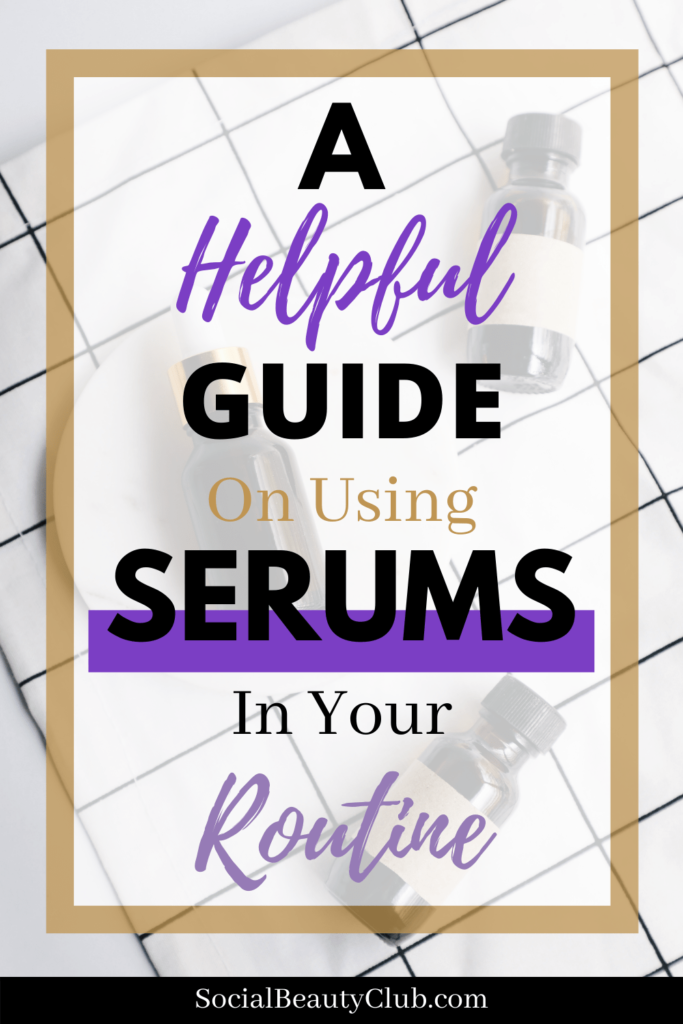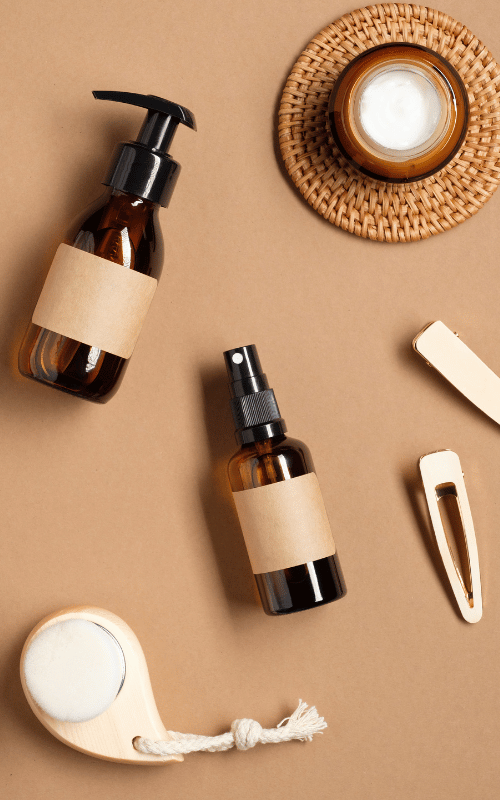A Helpful Guide On Using Serums In Your Routine
A little bottle packed with powerful ingredients
Skin Care | June 12, 2021
This post may contain affiliate links, which means I’ll receive a commission if you purchase through my links, at no extra cost to you. Please read full disclosure for more information.

Before, a simple skincare routine would not incorporate any serums. It was all about making sure you had a great facial cleanser, a toner, moisturizer, and maybe a physical exfoliator. These four products are great to use, but they are most times just not enough.
Acne-prone skin, aging skin, dull skin, and other skin types sometimes need products to deliver better results to target various skin issues. If you want to improve the appearance of your skin, consider investing in a good serum.
You will need to know what a serum can provide for your skin, what types of skin concerns serum can correct, and the best way to apply it. With all that information, you will be ready to make a well-informed purchase and be one step closer to clearer skin.

What is a Serum?
Before you learn how to use a serum in your skincare routine, you should know what is inside a serum. Also, it will be helpful for you to understand its purpose. What you will receive from your serum are great ingredients that can deeply penetrate the skin.
The ingredients tend to have a smaller molecular structure, and that is what makes it easier for your skin to absorb these active ingredients. Serums contain topical antioxidants (Vitamin A, C, and E), topical retinoids, hydrating ingredients, nutrients, and ingredients to even out your skin tone.
The best part about using a serum is that they are target treatments for many skin problems, which I will go into detail about later. The downside to using them is that they are very potent due to their high concentration level, so it is best to be careful when using them.
As usual, when using a new product, do a patch test to confirm that your skin responds well to the product or ingredient. When using a serum, try to keep in mind that a little goes a long way.
Notes
- Serums tend to be a bit pricey, but if you don’t overuse them every day, then they can last a few months
- If you have sensitive skin, you should keep in mind that the active ingredients can cause irritation and dryness
- It is best to keep your serum in a cool, dry place
- Some active ingredients over time can become unstable, can oxidize, or lose effectiveness, so use it within six months to a year
Products That Are Often Confused For Serums
Serums are very similar to other facial products, which can be confusing to a potential consumer. It can leave you wondering if buying a serum is pointless because you got something similar. To help clear up the confusion, I will describe the similarities and differences between the facial products that seem like serums.
Many serums are full of moisturizing ingredients to help your skin retain moisture. That is the reason why they are often confused with moisturizers. Serums are not moisturizers such as face lotions and creams. Moisturizers are richer in texture, and they are used to create a barrier for your skin and lock in all the products and ingredients you used before.
Another confusing product is face oils. This confusion is due to the change in how companies market serums. Serums were traditionally water-based. At that moment, it was easy to see the difference between the two, but now that has changed. Now more serums are oil-based. So, when choosing a serum, you can either choose a water-based serum or an oil-based serum.
The only thing you need to keep in mind about oil-based and water-based serums is when to apply them in your skincare routine. Water-based serums go before your moisturizer, and oil-based serums go after your moisturizer.
Lastly, serums are often confused for an essence, but serums are pretty much an essence. What would only make serums and essences equivalent is when you use them in your routine. Your serum has to be used after your cleanser and before your moisturizer to be considered an essence.
Other than that, the difference between the two is the texture. Serums feel gooier and essences are watered-down.
What are the Benefits of Using a Serum?
With the previous information, you should have an idea of the purpose of using a serum in your skincare routine. Overall, serums are a great facial product to help target many skin concerns. For example, a serum can treat aging skin, dry/dull skin, hyperpigmentation, and acne.

Types of Serums for Different Skin Issues
Now that you know what a serum is and how you can benefit from using it, it is time to explain what serums do for each skin concern. By then, you will know what ingredients to look for if there is a specific skin concern you want to correct.
Anti-aging Serums
If you are worried about showing signs of aging and would like to minimize fine lines and wrinkles, using an anti-aging serum would be perfect. As we get older our production level of collagen decreases and our skin turnover rate becomes slower. Using an anti-aging serum will help encourage collagen production and skin renewal.
Also, these serums are great for any skin type, and you can start using them in your 20s.
The ingredients you will be looking for are retinol, caffeine, bakuchiol, green tea, hyaluronic acid, and proteoglycans.
Note: If you have dry skin, you should pay attention to the dosage when using retinol. It is best to start with a low dose such as, .20 – .25%.
Hydrating Serums
Hydrating serums are great when you feel like your skin is looking dull or your skin type is dry, and you are struggling to keep your skin hydrated. These serums will give your skin extra moisture so that your skin looks smoother and hydrated. They are more like a supplement to go with your moisturizer.
This serum is perfect for dry skin, but any skin type can benefit from using a hydrating serum, even oily skin.
For hydrating serums, the ingredients you should look for are vitamin E, vitamin B5, hyaluronic acid, niacinamide, peptides, luminescine, and glycolic acid.
Color-correcting or Skin Brightening Serums
A serum with the intended purpose to color-correct skin can help improve various skin concerns. When consistently using a color-correcting serum it can remove enlarged pores, fine lines, and hyperpigmentation. Exfoliating serums are generally tied in with color-correcting serum since they can lighten those dark marks and shrink those pores.
Glycolic acid serums are great if you want to improve your skin texture and overall appearance. As an AHA, this chemical exfoliant is perfect for targeting issues on the surface of your skin. It will help with removing any discoloration, dullness, and dead skin cells.
Ingredients to look for are azelaic acid, mushroom extract, vitamin C, kojic acid, L-ascorbic acid, phytic acid, arbutin, phytic acid, glycolic acid, ferulic acid, lactic acid, and licorice root.
Antioxidant Serums
Using antioxidants is needed for all skin types because they protect your skin from free radicals, which we are exposed to every day. If you are wondering what free radicals are, they are unstable molecules that cause damage to cells, proteins, and DNA. As these molecules can damage cells, they can cause premature aging.
So, using antioxidant serums can keep you from showing signs of aging prematurely and help improve the appearance of dull skin or discoloration. This serum targets fine lines, naturally brightens, and can repair your skin.
With an antioxidant serum, you want ingredients, such as green tea extract, Vitamin A, C, and E, arbutin, resveratrol, niacinamide, ferulic acid, melatonin, kojic acid, and L-ascorbic acid.
Note: If you are using a Vitamin C serum, you should apply it underneath your sunscreen for extra protection.
I am currently using Good Molecules Discoloration Correcting Serum. I have been using this serum for about a month now. This product contains 4% niacinamide, and I see my dark marks starting to fade away. Maybe in another month, I should see more results.
I will keep you updated on my results with a product review next month.
Acne Prone Serum
Acne-prone serums are one of those products your skin needs to increase collagen production, your skin’s repair process, reduce inflammation, regulate oil production, and unclog pores.
When buying this type of serum look, for vitamin C, retinol, niacinamide, zinc, and salicylic acid
How to Use a Serum?
It matters when you use a serum in your skincare routine so you can get the best results out of your serum. First, we start with the two different types of serums, water-based and oil-based. As I said earlier, water-based serums go under the moisturizer, and oil-based serums go on top of the moisturizer. Due to oil-based serums larger molecular size, it is best to apply them last.
If your skin is on the sensitive or dry side, then it is best to use a thicker moisturizer with the serum. You can use it twice a day and apply it all over your face and neck for full coverage.
More Information About Serums
- Give the serum about seven weeks to see how your skin responds to it
- Sometimes you can see rapid results, but that depends on the current state of your skin
- It is best to apply anti-pigmentation and antioxidant serums in the morning
- It is best to use anti-aging serums at night
- Serums work best after applied to just-cleaned skin because they can deeply penetrate the skin and deliver concentrated doses of nutrients
- Apply hydrating serums twice a day to keep your skin dewy and moisturized
- If there are any irritating active ingredients, then apply the serum over another product (ex: exfoliator)
Takeaways
Serums are great products that are full of powerful ingredients that are useful when targeting many skin concerns. If you are not currently using a serum in your routine, it will be a great addition. With various types of serums, I am sure you will find one perfect for your skin.



